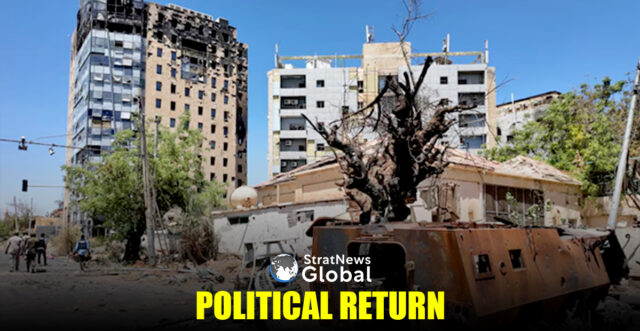Sudan’s ousted Islamist movement may back prolonged army rule as it seeks a political comeback, having deployed fighters during the ongoing conflict, say key members.
In his first media interview in years, Ahmed Haroun, chairman of the former ruling National Congress Party (NCP) and one of four Sudanese wanted by the International Criminal Court, told Reuters that he foresaw the army staying in politics after the war, and that elections could provide a route back to power for his party and the Islamist movement connected to it.
More than two years of war between Sudan’s army and the RSF has caused waves of ethnic killings, famine and massive displacement, drawing in foreign powers and creating what the United Nations has called the world’s biggest humanitarian crisis.
While the RSF remains entrenched in its western stronghold of Darfur and parts of the south, and there is no sign of a stop to the fighting, the army has made major advances in recent months, gains that Islamist operatives say they helped bring about.
Islamists Eye Political Return
Army leaders and former regime loyalists have played down their relationship, wary of the unpopularity of ousted ex-leader Omar al-Bashir and his NCP allies. But the army’s recent advances have allowed the Islamist movement to entertain a return to a national role, according to accounts from seven of the movement’s members and six military and government sources.
The NCP is rooted in Sudan’s Islamist movement, which was dominant in the early Bashir era during the 1990s when the country hosted Osama bin Laden, but has long abandoned hardline ideology in favour of amassing power and wealth.
The movement’s resurgence could cement the reversal of Sudan’s pro-democracy uprising that began in late 2018, while complicating the country’s ties with regional players suspicious of Islamist influence, including hardening a split with the powerful United Arab Emirates.
In a sign of the trend, several Islamists and their allies have been appointed since last month to the cabinet of Kamil Idris, the technocratic new prime minister named in May by the army.
In response to a request for comment from Reuters, a representative for Sudan’s army leadership said, “some Islamist leaders may want to use the war to return to power, but we say categorically that the army does not ally or coordinate with any political party and does not allow any party to interfere.”
‘Army In Politics’
Haroun, speaking to Reuters late at night from a hideaway without electricity in northern Sudan, said the NCP foresaw a hybrid governing structure in which the army retained sovereign control “until all threats are removed”, while elections brought in civilians to run the government.
“We have taken a strategic decision to not return to power other than by the ballot box after the war,” Haroun, a Bashir ally who escaped from prison at the start of the conflict, said in the interview in late April.
“The Western model is not practical in Sudan,” he said. “We must develop a model for the role of the army in politics, given fragile security and foreign greed, as this won’t be the first or last war in the country.”
A senior army officer suggested that a transitional period run exclusively by the army prior to elections “would not be brief.”
Haroun, wanted by the ICC for alleged involvement in war crimes and genocide in Darfur in the early 2000s — charges he dismisses as political — suggested a referendum to choose which army officer would lead the country.
Factions’ Revival
The revival of Islamist factions began before the outbreak of the war in April 2023, during a period when a transition towards civilian rule was veering off course.
The factions had established deep roots in Sudan’s ruling apparatus and in the army during Bashir’s three decades in power. When army commander General Abdel Fattah al-Burhan, who became head of Sudan’s ruling council shortly after Bashir’s overthrow in 2019, staged a coup two years later, he drew on their support.
The RSF participated in the coup but was suspicious of the Islamists, and as the RSF and the army moved to protect their interests ahead of another planned transition, tensions erupted into warfare.
The RSF quickly seized most of the capital, Khartoum, and made other advances, before the army started to claw back ground, extending its control over eastern and central Sudan.
(With inputs from Reuters)





